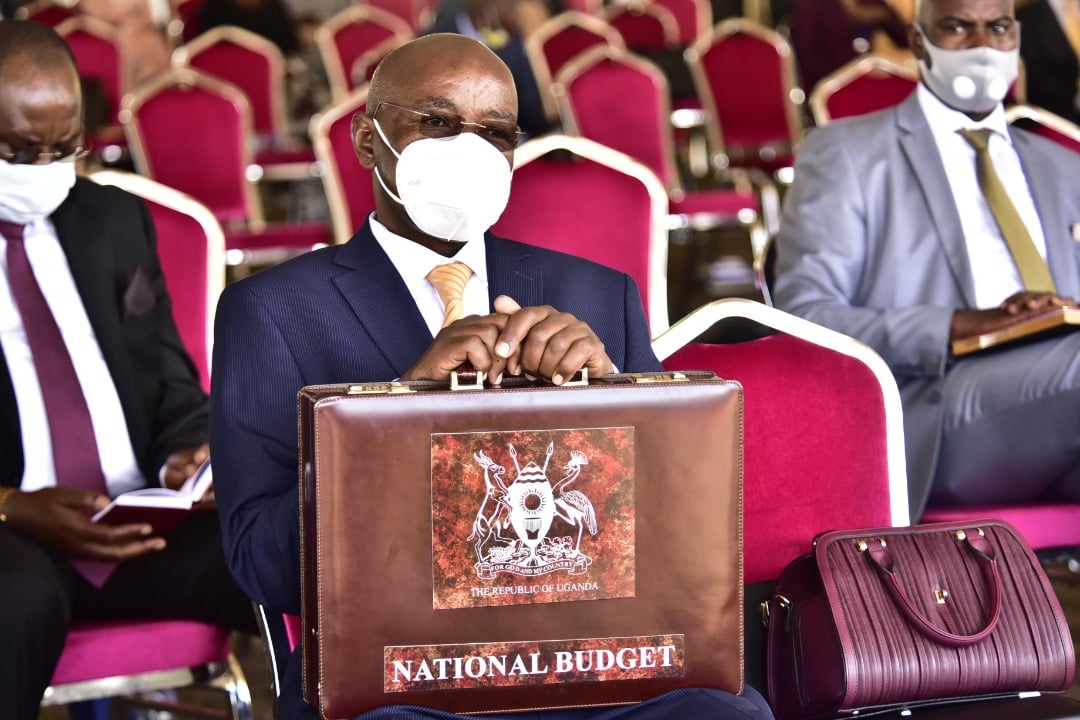Prime
Govt introduces six tax policy measures to increase domestic revenue to fund budget

Mr Amos Lugoloobi, newly appointed Minister of State for Planning reading budget during House sitting at Kololo Independence Grounds on June 10, 2021. PHOTO/ PARLIAMENT
To increase revenue collection and safeguard the government from the constraint of increasing public debt, the Ministry of Finance, Planning and Economic Development has announced new tax policy interventions.
Presenting the National Budget for the Financial year 2021/22, the designated minister of state for Planning, Mr Amos Lugoloobi at the Kololo ceremonial grounds said domestic revenue for next financial year is projected at Shs22.425 trillion, equivalent to 13.8 percent of GDP, compared to a projected outturn of Shs19.432 trillion, equivalent to 13.1 per cent of GDP in FY 2020/21.
Mr Lugoloobi said this target revenue is an increase of 0.7 percentage point of GDP. The increase in tax collections will be realized from an improvement in the level of economic activity, increased efficiency in tax collection by URA through strengthening compliance and enforcement, as well as new tax measures and administration reforms.
To achieve the stated revenue in the national budget for 2021/22, Mr Lugoloobi said the policy interventions to be implement during the course of the year includes reform taxation of rental income to remove the incentive for non-individual rental taxpayers to claim unrestricted deductions which significantly reduce their tax contribution. Reduce rates of depreciation for some classes of assets, discontinue the concurrent deduction of initial allowances and depreciation in the first year of use of qualifying assets.
The other policy intervention interventions he spelt out are: review the capital gains tax regime by allowing for the effect of inflation and providing tax relief for venture capital investments, broaden the scope of taxation of plastics to cover all plastics.
The other policy, according to the minister is rationalize the excise duty regime on telecommunication services by scrapping the excise duty on Over the Top (OTT) and introduce a harmonized excise duty rate of 12.0 per cent on airtime, value-added services and internet data excluding data for provision of medical services and the provision of education services.
“Introduce an export levy of 7 per cent on the value of fish maw exports, Impose an export levy of 5 per cent and 10 per cent on processed and unprocessed gold and other minerals respectively,” he said.
Regarding the tax administration measures, Mr Logoloobi said during the year, Uganda Revenue Authority (URA) will implement administrative interventions to boost revenue collection including the following: Strengthen tax arrears management and recovery; Enhance data analysis through interfaces with other Government information systems to enhance taxpayer compliance.
URA has also been compelled to enforce tax compliance using the Electronic Fiscal Receipting and Invoicing Solution (EFRIS) and Digital Tax Stamps; Enforce enhanced licensing requirements for clearing and tax agents, and bond operators; improve detection of smugglers using non-intrusive inspection equipment, and close all bonded houses for imported sugar for re-export to avoid undeclaration and misclassification.
“These administrative measures will generate about Shs 800 billion in revenue collections,” Mr Lugoloobi said.
Beside URA collecting taxes, Mr Logoloobi said the capacity of local governments to collect revenue will be enhanced through training and ICT infrastructure.
Mr Lugoloobi further explained that the fiscal strategy for Financial Year 2021/22 and the medium-term aims to create resources to finance priority interventions, while maintaining fiscal and debt sustainability.
“It is premised on mobilizing a higher level of domestic revenue and enhancing returns from public investment. The Government will also undertake a review of public expenditure to improve efficiency,” he said.
On the economic outlook, Mr Lugoloobi said the Economic Growth Strategy for the medium term aims to achieve faster and inclusive growth and enhanced socio-economic development. The target is to raise growth rates from 4.3 per cent estimated for Financial Year 2021/22 to at least 7 per cent in the medium-term.
He said the strategy that will achieve these medium-term objectives is three-fold: Restoring the economy back to the medium-term growth path; improving the wellbeing of the population to ensure a healthy and skilled workforce; and Providing peace, security and good governance.




